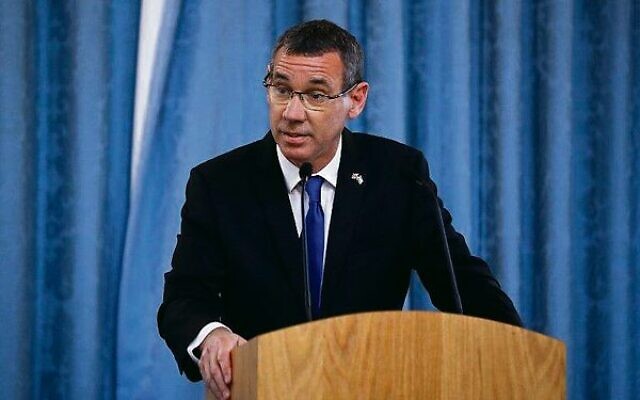Ambassador Mark Regev in Australia
Top Israeli security experts met with Australian politicians, journalists and government departments.

Top Israeli security experts were in Australia as part of the Be’er Sheva Dialogue, in which they met with Australian politicians, journalists and government departments to discuss areas of strategic interest. The dialogue was organised by the Australia/Israel & Jewish Affairs Council.
Among the Israeli contingent was ambassador Mark Regev, who is currently the chair of the Abba Eban Institute at Reichman University, and was previously ambassador to the UK (2016-2020), Israel’s international spokesperson for the prime minister’s office (2007-2016) and the Israeli PM’s senior adviser for foreign affairs and international communications (June 2020-April 2021). The AJN sat down with Regev, who grew up in Melbourne before moving to Israel in 1982 and forging a formidable career in diplomacy, to discuss his perspective on the state of play in Israel.
Asked about the opportunities for Israel’s incoming government, Regev said the “most important thing is Israel’s hopefully going to get a stable government”, adding that while he likes to say Israel is the only democracy in the Middle East, “five elections in four years is too much.”
Regarding the challenges ahead, domestically Regev said, “We have to beef up the police presence and protect Israeli Arab citizens better from crime.” On foreign policy, Regev pointed to Iran and said, “It will be interesting to see how the Biden administration decides to go forward” in light of the Iranian government’s brutal crackdown on protestors. He asked, “To what extent can the Americans say this isn’t happening and just negotiate a nuclear deal with this regime?”
As to how Australia’s relationship with Israel can be strengthened he said, “We want to see a good relationship between Australia and Israel,” but noted Israel’s disappointment with Australia’s decision to withdraw its recognition of west Jerusalem as Israel’s capital. Regev argued that even if you “talk about two states for two peoples and splitting Jerusalem … in all these concepts, west Jerusalem is always the capital of Israel.” Commenting on the situation with the Palestinians, Regev said, “You have an ageing autocrat [in Palestinian Authority President Mahmoud Abbas] … the whole political system on the Palestinian side is in stagnation. And Hamas are very extreme and Fatah don’t want to be seen as selling out the national cause. And because of President Abbas’ position and everyone looking over their shoulders who’s going to succeed him … it’s not a time for political initiatives.”
In light of this, Regev said the emphasis should instead be on economic issues “that can make life better for people involved, and also to try to expand the circle of peace with other Arab countries”. He said, that as “Arab states increasingly warm to Israel … I think that ultimately is good for peace, because that will in the end affect Palestinian opinion, too.”
Other Israeli participants in the dialogue were Deputy Chief of Staff of Israel’s Defence Force Major General Eyal Zamir, senior project director at the Jerusalem Centre for Public Affairs Brigadier General Yossi Kuperwasser, former head of the Policy & Political-Military Bureau at Israel’s Ministry of Defence Zohar Palti and Middle East journalist and commentator Ehud Ya’ari.

comments